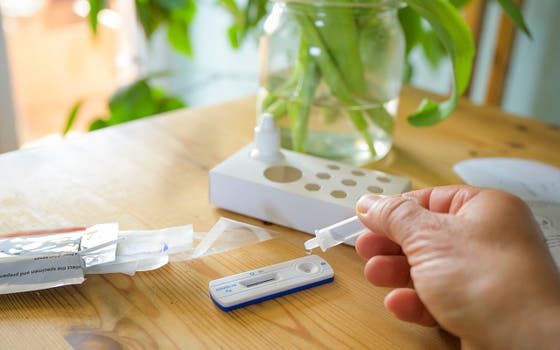Dec 13: Corona nasal self-test sufficiently reliable in symptomatic people, but not reliable in absence of symptoms

Recent Dutch research has shown that the corona antigen nasal self-test is sufficiently reliable if, at the time of testing, a person has symptoms or complaints that fit a corona infection, but not in the absence of symptoms or complaints. In addition, the saliva self-test, which requires spitting into a tube, appears to be insufficiently reliable regardless of the presence or absence of symptoms.
Many countries eased coronas measures after the rollout of vaccinations. The higher infection rate of the delta variant and the onset of the winter season have significantly increased the need for testing. However, the diagnostic accuracy of the self-tests is largely unknown. Researchers at UMC Utrecht, in collaboration with the GGDs of West Brabant, Hart van Brabant and Rotterdam Rijnmond, the laboratories of Microvida and Erasmus MC, and RIVM have compared the reliability of a widely used corona nasal self-test with that of a saliva self-test available on the Dutch market in the largest study to date (almost 3,000 people). To relieve testing facilities, the Ministry of Health, Welfare and Sport in the Netherlands, based on this study, recommends now that the corona nasal self-test can be used in non-vulnerable people and in the presence of mild symptoms.
Corona nasal and saliva self-tests studied
In the study, individuals 16 years of age and older were tested at three Dutch Public Health Service test sites, regardless of their indication for testing, symptoms and vaccination status. Each participant was given a PCR test and then provided with two self-test kits to take home: a nasal self-test and a saliva self-test. They were asked to perform both self-tests after arriving home within a few hours, not yet knowing the result of the PCR test. After the participants reported the results of both self-tests, the accuracy for each test was then determined, using the PCR test as reference.
Based on the PCR test, 6.5 percent of participants had a coronavirus infection during the period studied. The overall sensitivities were 85/182 (47 percent) for the saliva self-test and 124/180 (69 percent) for the nasal self-test. After correction for infectivity, this was 55 percent for the saliva self-test and 84 percent for the nasal self-test. Based on this, the researchers conclude that the nasal self-test has almost the same reliability as when these tests are administered by professionals in a GGD test facility. However, the saliva self-test studied is not sufficiently reliable.
Only reliable for persons with symptoms
The reliability of the self-tests was also compared in persons with and without symptoms. In those with symptoms versus without symptoms, the sensitivities were 51 and 26 percent for the saliva self-test, and 79 and 23 percent for the nasal self-test, respectively. After adjusting for infectivity, this was 57 percent and 39 percent for the saliva self-test, and 90 percent and 39 percent for the nasal self-test. These figures demonstrate that the nasal self-test is sufficiently reliable, but only in persons who have symptoms of a corona infection at the time of testing. However, in persons without symptoms, the nasal test is not sufficiently reliable.
Epidemiologist Dr. Carl Moons (Julius Center for Health Sciences and Primary Care, UMC Utrecht) and principal investigator of the study says: "The results of our study form the basis for the Dutch testing policy, which has been adjusted recently. It has become clear that this corona nasal self-test has a reliability that can be compared to when this test was executed by GGD staff, but only if the people have complaints fitting a corona infection. For asymptomatic people, the nasal self-test is not sufficiently reliable. The saliva self-test studied is not sufficiently reliable, regardless of whether one has complaints or not."
The results of this study apply specifically to the nasal and saliva self-tests studied. The research group is further investigating the reliability of a number of other commonly used nasal self-tests, both in people with and without symptoms.
Publication
Schuit E, Venekamp RP, Veldhuijzen IK, Bijllaardt W van den, Pas SD, Stohr JJJJM, Lodder EB, Hellwich M, Molenkamp R, Igloi Z, Wijers C, Vroom IH, Nagel-Imming CRS, Han WGH, Kluytmans JAJ, Hof S van den, Wijgert JHHM van de, Moons KGM. Accuracy and usability of saliva and nasal rapid antigen self-testing for detection of SARS-CoV-2 infection in the general population: a head-to-head comparison. Preprint posted on medRxiv, December 11, 2021
